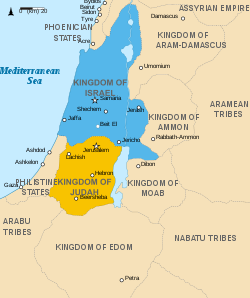Jew (word)
'of Judah'), which passed into Greek as Ioudaios and into Latin as Iudaeus, in turn evolving into the Old French term giu after the letter "d" was dropped.
[1] A variety of related forms are found in early English from about the year 1000, including Iudea, Gyu, Giu, Iuu, Iuw, and Iew, which eventually developed into the modern English word for the Jewish people.
After the conquest and settlement of the land of Canaan, Judah also referred to the territory allocated to the tribe.
The kingdom now encompassed the tribes of Judah, Benjamin and Simeon, along with some of the cities of the Levites.
The term Yehudi (יְהוּדִי) occurs 74 times in the Masoretic text of the Hebrew Bible.
In Esther 2:5–6, the name "Yehudi" (יְהוּדִי) has a generic aspect, in this case referring to a man from the tribe of Benjamin: The name appears in the Bible as a verb in Esther 8:17 which states: In some places in the Talmud the word Israel(ite) refers to somebody who is Jewish but does not necessarily practice Judaism as a religion: "An Israel(ite) even though he has sinned is still an Israel(ite)" (Tractate Sanhedrin 44a).
The Old French giu, earlier juieu, had elided (dropped) the letter "d" from the Latin Iudaeus.
Etymological equivalents are in use in other languages, e.g. Jude in German, judeu in Portuguese, jøde in Danish and Norwegian, judío in Spanish, jood in Dutch.
[6] According to rabbi Marcus Jastrow's dictionary, yehudi is defined as "worshipper of one God" and rejecting idolatry.
Instead, citizens of the state of Israel, whether Jewish or not, are called "Israeli", while "Jew" is used as an ethno-religious designation.
The German counterpart Jude was extensively used during the Nazi period as a part of its anti-semitic campaign (eventually leading to genocide).
Some people, however, have become so wary of this construction that they have extended the stigma to any use of Jew as a noun, a practice that carries risks of its own.



